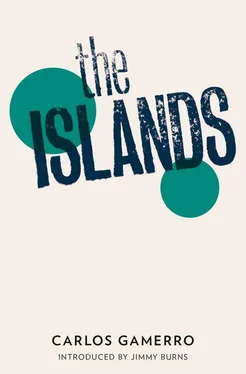Not him, I thought; you don’t touch Diego. I can’t say I’d planned it: it was more like my eyes made out his fingers in the door frame and, so fast that it was almost simultaneous, my ears heard a horrendous crunch instead of a slam. Tarino also seemed to be affected by this strange distortion of time because, before starting to howl, he managed to show me his hand, its fingers pointing in different directions like the vanes of a swastika and, as if asking me for confirmation, he stammered out:
‘You … you’ve broken every bone in my hand.’
‘You can use them as small change,’ I replied and walked away through the empty corridors as fast as I could until his screams had stopped ringing in my ears.
I walked twenty blocks against the biting wind, my head full of noise, loathing the very paving stones I trod on, till suddenly the taxis and buses in the street were replaced by scattered people walking in slow-mo under a neon sky and I realised I’d crossed Avenida 9 de Julio and reached the pedestrian stretch of Calle Lavalle. Cinemas, video arcades, tacky import outlets, ice cream parlours recycled for the winter into purveyors of choripáns belching their greasy breath at the passers-by; couples without two cents to rub together, kids sporting hostile mohicans and shaven heads sitting on the pavement drinking Quilmes by the litre at the mouths of kiosks, a trio of shivering Collas numb with cold conjuring up the memory of Andean snows with their flutes and panpipes … over this sad Thursday-evening fauna of Lavalle floated a threatening aura of radioactive waste.
I entered the arcade, with its relief of mountains at the back, complete with artificial lake and working waterfall, plastic plants, blue skies and painted clouds, and I asked Víctor, the bloke in charge, for the 3D Tetris.
‘Hasn’t arrived yet. Held up in customs. But that one’s new.’
I played for a while, the slow rain of bricks from above speeding up as I shunted them around and rotated them to fit them together and leave no gaps, wall after wall after wall. Not for a second did the rudimentary concentration required for the game quiet the roaring in my head and, bored with winning, I handed it over mid-game to the inevitable gawper who, in his befuddlement, let all the pieces pile up and lost.
‘Gimme a token for the pinball,’ I said to Víctor.
I thought it would be easier to relax with pinball because, being mechanical, it makes you use your body more than your head. Once, taking advantage of the fascination with the first wave of video games, when you couldn’t give pinball machines away, I bought a pinball machine at an auction. It worked fine for a while: it was the life and soul of the house and a wonderful way of reconnecting to the real world after one of my cyber-marathons; but it soon began to fade and die. The springs lost their spring, the lights were reluctant to light and the bleeps became moans as if it were in pain. I ended up swapping it for a digital one, but that was an anti-climax. A simulation’s never the same as the real, live thing; I missed the contact, and the sounds it made were cold and unnatural.
I’d made 573,655 points on my first ball when the fatigue hit me; a collage of desolate, empty maps from my Filcar guide began to superimpose itself over the crazed trajectories of the little silver balls and, disheartened, I left all three to bounce around for a bit, warbling and flashing their little lights, then disappearing into the open jaws of the machine. I did nothing to save them. That night, with the day’s images in hot pursuit and that dreadful crunch still ringing in my ears, I was racked with insomnia and, to make matters worse, a car alarm went off under the flyover and I couldn’t get to sleep until the battery ran out several hours later, around dawn. By the time I woke up, it was almost three in the afternoon. I’d set my alarm program for ten and, five hours later, the accursed words, which I knew by heart, were still echoing in my ears: ‘Wakey wakey. Time to get up. You’ve got loads of stuff to do. I mean loads. If you don’t get up now, you’ll spend the rest of the day running around trying to catch up, everything’ll go wrong and you’ll hate yourself for not getting up early enough. If you get up now, you’ll have time for a shower and a quiet breakfast and a read of the paper, and you’ll feel really good, walking down the sunny side of the street, seeing people, the whole day ahead of you. If you get up late, though, like you do every day, you’ll leave the house dirty and hungry, your beard’ll itch and your shirt collar’ll feel too tight all day, it’ll rain and the buses won’t stop when you stick your hand out. If you at least enjoyed sleeping in, but you suffer every single minute, and that suffering’s nothing compared to what’s in store when you get up late, your eyes swollen from sleep, your mouth all claggy, your teeth hurting from grinding them in your sleep: your day ruined before it’s started.’ The recorded message went on and on, redoubling the verbal lashing every thirty minutes, until after four hours it switched to: ‘That’s it. You’ve fucked up again. Forget it. Stay in bed. Wallow in it like a pig then. Don’t go out. Don’t see anyone. Tonight, when you’re up till dawn with insomnia and you feel as if you’re turning into E.T., you’ll remember what I’ve been telling you. No. Don’t even dream of getting up. The harm’s done. Just enjoy — ha! — your couple of hours in bed.’ I hardly ever got up before that part, but I must have been seriously done for today, because only an hour later did I manage to remove the mound of blankets that stood between me and all harm, and stagger to the bathroom.
* * *
The country landscape was bisected by Avenida Chorroarín. On my side of the street, behind a high wire fence under a tepid winter sun, shone a stretch of fertile, productive pampas, with its tender green grass and imperturbably grazing cows; but on the other side, the open country offered an image of the primæval desert, with patches of thistles taller than a man on horseback, weeds and little patches of woodland. A peculiar atmosphere hung about the whole place, as if the ghost of the colossal hulks of the Warnes Hospital, demolished a year earlier, still haunted the blighted land and prevented its regeneration. Lucky I’m heading in the opposite direction, I thought as I negotiated the gates of the Faculty of Agronomy and Veterinary Science, leaving the gloomy post-nuclear landscape behind me. I should come here more often, for picnics or runs, it’s almost like the real countryside, I thought, and as if to corroborate, a gaucho went past on horseback — harness, reins, saddle, the whole bit — headed for the tilled fields of Avenida San Martín; not even the white coats of the students who crossed my path could dispel the illusion. ‘The Institute of Experimental Medicine,’ I asked a pretty blonde, who stuck out a fleshy lower lip to show she didn’t know, and I tried two or three more until one (ugly, naturally) offered to escort me. ‘It’s over there,’ she said, pointing to a low casemate at the side of some wire-fenced, concrete-paved yards, at the far end of a lawn where a crowd of her fellow students were chatting in small groups, or having lunch on the hoof, or anxiously reading their notes as they leaned against square concrete pillars. The path led between two huge rocks embedded in the grass by some landscape gardener’s dubious eye, and I could barely keep myself from yelping with fright when one of them moved. I walked around them and only then did I see the outstretched legs and the heads trying to raise themselves from the floor. The two cows were covered in purple contusions and coagulated gore; the one that had moved followed me with its liquid brown pupils, its breath audibly bubbling through the light froth of blood around the muzzle.
Читать дальше











